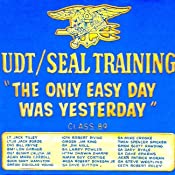Navy SEALs are renowned for their intense and demanding training programs, designed to push individuals to their physical and mental limits. This daring book, Dare To Live Greatly by Larry Fowler, takes you down a path experiencing Navy SEAL training as though you were in the chilly Pacific Ocean yourself. Embrace all three phases of BUD/S like you’re breathing the warm Coronado air yourself. Feel the pain as you run up and down the Golden Strand. This rigorous preparation is necessary to develop the resilience and capability needed for high-stakes missions. No matter how painful the suffering, the misery will never escape a BUD/S candidate. Nor will the suffering of living a Christian life.

Let’s begin by looking at the components of Navy SEAL training:
Physical Conditioning
The physical demands of SEAL training are extraordinary. Recruits undergo grueling exercises to build strength, stamina, and endurance. These exercises are not just about physical growth but about breaking through perceived limits. The aim is to condition their bodies to withstand extreme conditions and perform optimally even when exhausted. This level of physical conditioning is crucial for their success on the battlefield, as it ensures they can carry out physically demanding tasks under duress.
In addition to basic exercises, SEALs engage in activities that simulate real combat scenarios. They train in diverse environments, from swimming in the ocean to running long distances with heavy equipment. This variety in training not only builds physical strength but also fosters adaptability and readiness for any situation. The physical challenges faced during training serve as a metaphor for the obstacles one might encounter in life, requiring both strength and endurance to overcome.
Did you know that missionary Christians face tremendous physical challenges as well? In fact, stamina and endurance are required for being bold, living courageously in a darkened world.
Mental Toughness
Equally important is the cultivation of mental toughness. SEALs are trained to remain calm and focused under pressure, making quick decisions in life-or-death situations. This mental fortitude is developed through exercises that simulate high-stress environments, testing their ability to stay composed and decisive. Training often includes sleep deprivation, complex problem-solving tasks, and high-pressure decision-making drills.
The mental preparation includes strategies for maintaining focus and clarity in chaos. SEALs learn to compartmentalize their thoughts, focusing on the task at hand without being overwhelmed by external stressors. This mental discipline is a critical component of their training, allowing them to maintain operational effectiveness in the face of adversity. The ability to manage stress and keep a clear head is not only essential in military operations but also in daily life, where unexpected challenges and stressors can arise.
No one can deny the mental toughness that Christians are required to live in a self-driven, greed-seeking world today.
Teamwork and Leadership
SEAL training emphasizes the importance of teamwork and leadership. Recruits learn to work cohesively as a unit, relying on one another’s strengths and supporting each other through challenges. This collaborative spirit is essential for mission success and is a hallmark of SEAL operations. The training instills a deep sense of trust and reliance among team members, knowing that their survival depends on each other’s performance.
Leadership is cultivated through experience, as recruits are often placed in positions where they must lead their peers. This experiential learning fosters an understanding of both leadership and followership, recognizing the value of each role within a team. Team-building exercises are designed to highlight the importance of communication, trust, and mutual respect. These principles of teamwork and leadership are directly applicable to any group dynamic, emphasizing the value of collaboration in achieving common goals.

Parallels with Christian Living
In “Dare to Live Greatly,” L.C. Fowler draws insightful comparisons between the elements of SEAL training and the journey of Christian living. Here are some key parallels:
Spiritual Conditioning
Just as physical conditioning is vital for Navy SEALs, spiritual conditioning is essential for Christians. This involves regular practices such as prayer, meditation, and studying scripture to strengthen one’s faith and spiritual resilience. These practices equip individuals to face life’s challenges with grace and conviction, grounding them in their beliefs.
Spiritual conditioning requires commitment and routine, much like physical training. It involves setting aside dedicated time for spiritual growth activities, creating habits that cultivate a deeper connection with one’s faith. Engaging in community worship and personal reflection can help reinforce these practices, providing both support and accountability. Just as SEALs train their bodies to be resilient, Christians must train their spirits to withstand spiritual battles and remain faithful under pressure.
Developing Spiritual Resilience
Christian living requires a level of mental toughness akin to that of SEALs. Believers must cultivate resilience to navigate the trials and tribulations of life. This resilience is built through faith in action, trusting in God’s plan, and remaining steadfast even in the face of adversity. It involves a proactive approach to life’s challenges, viewing them as opportunities for growth rather than obstacles.
Spiritual resilience is about maintaining hope and peace amid uncertainty. It is developed through experiences that test faith, requiring believers to rely on their spiritual foundation. By embracing challenges as part of their spiritual journey, Christians can grow stronger and more steadfast in their beliefs. This perspective encourages a mindset that sees beyond immediate difficulties to the greater purpose within them.
Community and Fellowship
The emphasis on teamwork in SEAL training mirrors the importance of community and fellowship in Christian life. Believers are encouraged to support one another, share in each other’s joys and struggles, and work together to fulfill their collective mission. This sense of community strengthens individual faith and fosters a spirit of unity.
In Christian communities, fellowship provides a network of support and encouragement. It is a space where believers can share experiences, offer guidance, and celebrate spiritual victories together. This collective journey enhances personal growth, as individuals learn from one another and are inspired by the faith of others. Building a strong community is essential for sustaining spiritual health, much like the camaraderie developed in SEAL teams ensures operational success.
Faith in Action: Living with Purpose
One of the central themes of “Dare to Live Greatly” is the concept of faith in action. Fowler challenges readers to move beyond passive belief and actively engage with their faith. This involves living with intention, purpose, and a commitment to embodying Christian values in everyday life.
Overcoming Challenges
Just as SEALs face formidable challenges, Christians are called to overcome obstacles in their spiritual journey. These challenges can take many forms, from personal struggles to societal pressures. By drawing on the strength of their faith and the support of their community, believers can navigate these challenges with courage and determination.
Facing challenges requires a proactive mindset and a willingness to confront difficulties head-on. It involves recognizing the resources available, such as prayer, scripture, and fellowship, and utilizing them to find solutions and maintain faith. Overcoming challenges is not just about personal triumph but about growing closer to God and understanding His purpose in life’s trials. This approach fosters resilience and helps believers maintain their commitment to living a life that honors their faith.
Embracing Growth
Both Navy SEAL training and Christian living emphasize the importance of growth and transformation. For SEALs, this means continually honing their skills and capabilities. For Christians, it involves a deepening of faith and an ongoing journey of spiritual growth. This process requires dedication, humility, and a willingness to learn and adapt.
Spiritual growth is a lifelong journey that involves constant learning and self-reflection. Believers are encouraged to seek wisdom through scripture and the guidance of spiritual mentors. This growth is marked by an increasing alignment of one’s life with Christian values, leading to a more profound sense of purpose and fulfillment. The journey of spiritual growth is not without its challenges, but it is through these experiences that faith is refined and strengthened.
Living with Intention
Living with intention is a key aspect of faith in action. It involves making conscious choices that reflect one’s values and beliefs. For Christians, this means aligning everyday actions with the teachings of Christ, ensuring that decisions are guided by faith and not merely by convenience or cultural norms.
Intentional living requires mindfulness and reflection, considering the impact of one’s actions on both personal faith and the wider community. It challenges individuals to evaluate their priorities, ensuring that their lives are focused on what truly matters. By living intentionally, Christians can make meaningful contributions to their communities and inspire others through their example. This purposeful approach to life is a powerful testament to the transformative power of faith.
The Journey of Transformation
L.C. Fowler’s book invites readers to embark on a journey of transformation, drawing inspiration from the parallels between Navy SEAL training and Christian living. By embracing the principles of discipline, resilience, and community, individuals can lead lives of purpose and impact.
Building a Strong Foundation
A key takeaway from “Dare to Live Greatly” is the importance of building a strong foundation. For SEALs, this foundation is physical and mental strength. For Christians, it is a deep and abiding faith. This foundation serves as the bedrock for navigating life’s challenges and pursuing one’s mission with clarity and confidence.
Establishing a solid foundation requires ongoing effort and commitment. For believers, this means engaging in regular spiritual practices and seeking continual growth in their faith. A strong foundation equips individuals to face life’s uncertainties with assurance, knowing they are grounded in something greater than themselves. This stability is crucial for maintaining perspective and resilience in the face of adversity.
Living Authentically
Fowler encourages readers to live authentically, aligning their actions with their beliefs. This authenticity is a powerful testament to one’s faith and can inspire others to embark on their own journeys of transformation. By living authentically, individuals can make a meaningful impact on the world around them.
Authentic living involves embracing one’s true self and expressing faith through genuine actions. It requires courage to stand by one’s convictions, even when faced with opposition or misunderstanding. This authenticity fosters trust and respect, as others see the sincerity and integrity in one’s life. By living authentically, Christians can demonstrate the transformative power of faith and encourage others to explore their spiritual journeys.
Inspiring Others
The journey of transformation is not just personal; it has the potential to inspire those around you. Fowler’s book emphasizes the ripple effect of living greatly, as individuals who embrace this journey can positively influence their communities and beyond. By embodying the principles of faith, discipline, and resilience, believers can inspire others to explore their potential and pursue their paths of growth and transformation.
Inspiring others involves sharing one’s story and the lessons learned along the way. It is about being a source of encouragement and support, helping others to see the possibilities within their own lives. Through acts of kindness, compassion, and leadership, believers can create a legacy that extends beyond their immediate sphere, impacting future generations.

Conclusion: Dare to Live Greatly
“Dare to Live Greatly” by L.C. Fowler offers a compelling exploration of the intersections between Navy SEAL training and Christian living. Through vivid storytelling and insightful comparisons, Fowler challenges readers to embrace a life of purpose, resilience, and faith in action. By drawing on the principles of discipline and community, individuals can transform their lives and live greatly.
Whether you’re seeking to deepen your faith, overcome challenges, or simply live with greater intention, this book provides a roadmap for a transformative journey. Dare to live greatly and discover the extraordinary potential within you. The journey toward greatness involves embracing the principles discussed and applying them to everyday life, allowing one’s faith to guide and inspire a life of significance and impact.
